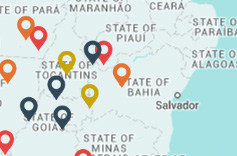Ambiens Institute of Research, Education and Planning
Popular World Cup Committee of Curitiba: guaranteeing human rights, networking and collectively constructing knowledge
Paraná
Objectives and target population:
The Popular World Cup Committee of Curitiba will mobilize social groups and communities impacted by the 2014 World Cup activities in the city. This mobilization will empower the population to defend its rights and democratic participation in decisions related to the mega-event. The project will also shine a light on current human rights violations, so that they can be avoided or repaired.
This population includes around five thousand residents in areas affected by the projects planned: people living in the street, low-income communities, street vendors, trash pickers, sex professionals and workers on projects related to the event, among other groups.
Main activities:
– Meetings and workshops will be held, with the participation of those affected, and including the distribution of booklets and handouts produced especially for these events;
– “Ball Debate”: Three meetings for discussion with diverse sectors of society on issues surrounding the mega-events in Curitiba and the metropolitan region;
– Construction of dialog between the Committee and society in general, through the reconfiguration of the Committee’s website, creating a means for public participation and a database with public events;
– Production of information to update the dossier of impacts from the mega-events in the city;
– Public disclosure of the results and presentation of the dossier.
Context:
Human rights violations due to the 2014 World Cup are the focus of the proposed project. The pattern followed has been the implementation of neo-developmentalist policies of the Brazilian state (largely financed by federal agencies); the privatization of local governance (in close cooperation with the corporate sector); and interventions directed toward the sporting mega-events (which serve as a justification for urgently implementing mega-projects). Announced as important social legacies of these events, mega-projects have violated the rights to housing, participation and information.
These effects are amplified by the imposed “state of exception” on the part of the state and World Cup promoters, with legal flexibility and suspension of rights before and during the games.
Municipal Law n. 13.620/2010, for example, conceded to the Joaquim Américo Guimarães Stadium R$90 million in construction funds to finance a particular project; while the Complementary Law n. 77/2010, much the same, guarantees full exemption from city property taxes for FIFA. Furthermore, other projects that have been announced will demand expropriations, such as the “Metropolitan Corridor” and the construction of the third runway at Afonso Pena Airport.
Informal workers, sex professionals, street vendors and those who live in the street have felt an increase in repression and criminalization, with the intent to “clean up” the city. Meanwhile, poor communities have waited for years for the installation of basic public services such as hospitals, daycares, schools and health clinics.
About the organization:
The Ambiens Institute of Research, Education and Planning will be responsible for the management of the project’s resources. The institute’s mission is to promote research and education on the theme of the right to the city.
Activities will be held in partnership with the organizations, collectives and people who make up the Popular World Cup Committee of Curitiba. The Committee consists of a network of different actors from organized civil society that defend the human rights of populations threatened by urban interventions related to the World Cup.
The Committee holds training and mobilization activities in the affected communities and offers technical and political support to the groups impacted by these changes to the urban design of the city. It also monitors actions/decisions by the authorities related to the theme and discloses information to society in general.
Partnerships:
The Committee is composed of representatives of more than thirty organizations (social movements, NGOs, universities, trade unions, independent media and culture collectives and the affected communities) and makes up part of Ancop – the National Network of Popular World Cup Committees.
Funding Line
Urban Development (2012)
Year
-
Total Granted
-
Duration
-
Main Themes
The right to just and sustainable cities






